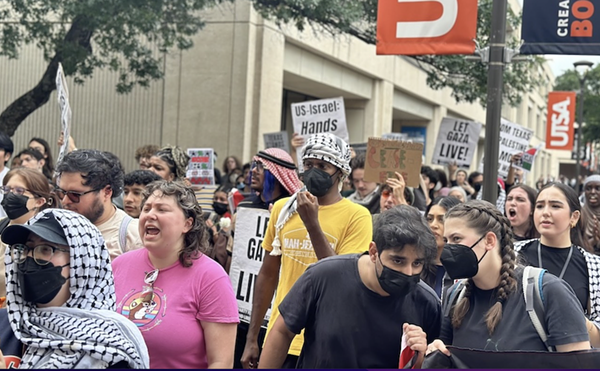Last week, just three days after San Antonio played host to one of the largest Martin Luther King Jr. Day marches in the nation, the Lone Star State celebrated Confederate Heroes Day.
The latter holiday, enshrined into law by the Texas Legislature in 1973, is a stark reminder of the state's complicated history with race. It's a former slave state and a member of the Confederacy, and racial segregation remained on its books for nearly 100 years after the Civil War.
Even so, Texas has made great headway in race relations. A recent study by personal finance site WalletHub even ranked the state as the seventh-most racially integrated in the nation.
But what exactly is the study talking about?
"I think it's hard to tell what the data actually means," said Cal Jillson, a professor of Texas and American history at Southern Methodist University in Dallas. "I think you have to view [the study] as a conversation starter, but it's certainly not definitive."
Jillson, the author of books including Lone Star Tarnished: A Critical Look at Texas Politics and Public Policy, and an expert on race and the American Dream, is skeptical of WalletHub's analysis, especially the health and education data used in ranking of states.
The study analyzed data in categories including employment, wealth, education, health and civic engagement to determine how racially integrated states are between Black and white residents. Researchers gave states scores on metrics specific to each category, then ranked them accordingly. For example, the study used the share of adults with at least a high school diploma as a metric when ranking states on racial integration in education.
Loopholes and conflation
WalletHub ranked Texas' education system as the eighth-most racially integrated in the nation. Texas also tied with California, New Mexico, Wyoming and West Virginia as the state with the smallest racial gap between Blacks and whites who had earned a high school diploma.
Jillson isn't buying it.
In 2005, Texas' high school graduation rate was among the worst in the nation, with only 72% of students graduating on time, according to the National Center for Education Statistics. However, the state's graduation rate has climbed ever since, with academics attributing the current graduation rate, now around 90%, to a major loophole. Specifically, Texas allows schools to avoid counting students who left for another district for a variety of reasons.
"Texas went from having comparatively low graduation rates to a very high graduation rate among the 50 states because of that change," Jillson said. "You can't tell whether the difference between white and Black graduation rates are narrower than in other states because you can't trust the numbers to begin with."
In WalletHub's analysis, Texas also scored above average on racial integration in health care. However, the study fails to include data about the number of people in Texas without health insurance, which at around 18%, stands as the highest in the U.S., according to the nonprofit United Health Foundation.
"Texas has more uninsured people than any other state in the nation," Jillson said. "We spend less on mental health treatment than almost any other state in the nation. And yet, we're ranked No. 3 in health [in this study]."
Overall, WalletHub's study appears to conflate racial diversity with racial integration. Although a geographic region may be diverse, that doesn't mean residents of all races enjoy similar economic outcomes.
For example, San Antonio is one of the few majority-minority cities in the U.S., with less than a quarter of the city's population identifying as white, according to the U.S. Census Bureau. However, the Pew Research Center named the Alamo City and its surroundings the most economically segregated large metro area in the U.S. in 2012.
"In San Antonio, you have the same divisions that you have in Dallas or Houston, with Hispanics mostly living on the South Side, African Americans on the East, and white people on the North Side," Jillson said.
Making progress
So, how racially integrated is Texas?
It's hard to come up with a definitive answer, and it's much too complex to answer in a dataset, according to Jillson.
However, there are specific steps the state can take to improve access and outcomes for people of all races.
William Darity, an economics professor at Duke University and expert on public policy and African American studies, served as a consultant for WalletHub's analysis.
Darity was unavailable for comment for this story. However, in the report, the professor points out that a national healthcare system is the only way to ensure that everyone has equal access to necessary health services.
"While we need a national system of health insurance or health services that assures all Americans of quality healthcare, states can implement such programs as models for a federal system," he wrote.
Jillson agrees with Darity's sentiments, adding that a better statewide Medicaid system funded under ObamaCare could put Texas closer to achieving racial equality.
Further, Jillson said Texas' state government could divert more funds to public education instead of relying on municipalities to fund public education through property taxes — something that favors wealthier communities with higher home values.
Darity goes one step further in the report, encouraging school districts to tackle issues like the lack of Black representation in advanced placement classes. Even so, he's wary that any state can genuinely achieve racial integration without the help and funding of the federal government.
Follow us: Google News | NewsBreak | Instagram | Facebook | Twitter


















